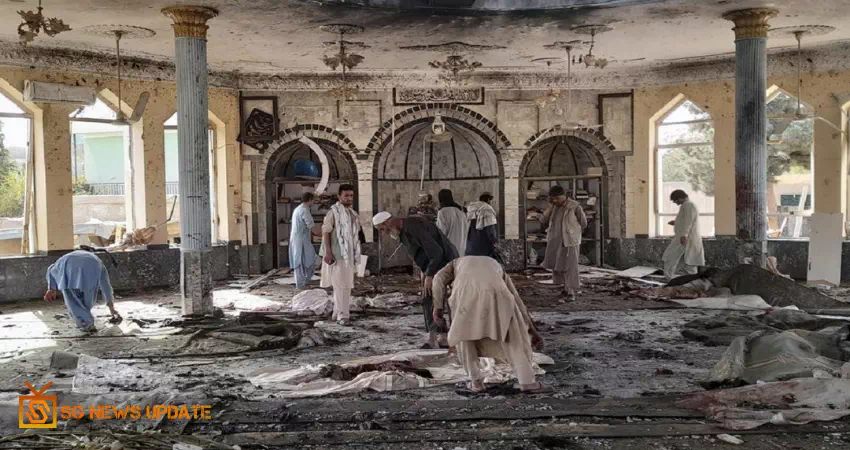
A suicide bomb attack on devotees at a Shiite mosque in the Afghan city of Kunduz killed something like 55 individuals Friday, in the bloodiest attack since US soldiers left the country. Scores additional casualties from the minority community were injured in the impact, which was claimed by the Islamic State group and seemed intended to additionally undermine Afghanistan in the wake of the Taliban takeover.
The Islamic State group, rancorous adversaries of the Taliban, has over and again chosen Shiites in a bid to work up partisan violence in Sunni-majority in Afghanistan. In an assertion delivered on its Telegram platforms, the Islamic State said that an IS suicide bomber "exploded an explosive vest in the midst of a crowd" of Shiite devotees who had accumulated inside the mosque. The assertion distinguished the bomber as "Muhammad al-Uyguri", inferring he was an individual from China's basically Muslim Uyghur minority.
A clinical source at the Kunduz Provincial Hospital said that 35 dead and in excess of 55 injured had been taken there, while Doctors Without Borders (MSF) said 20 dead and scores more injured were brought to its clinic. Mulawi Dost Muhammad, Taliban security head of Kunduz, blamed the assailants for attempting to incite troublesomeness among Shiites and Sunnis, and demanded there was no dispute between the development and the minority. "We guarantee our Shiite siblings that later on, we will give security to them and that such issues won't occur to them," he said.
Occupants of Kunduz, the capital of an area of a similar name, told the impact hit the mosque during Friday petitions, the most significant of the week for Muslims. One observer, Rahmatullah, said 300 to 400 admirers were inside.
Realistic pictures shared via web-based media, and which couldn't quickly be confirmed, showed a few bloodied bodies lying on the floor. Pictures showed crest of smoke ascending into the air over Kunduz. A female instructor in Kunduz told AFP the impact occurred close to her home, and a few of her neighbors were killed. "It was an exceptionally frightening occurrence," she said. "A significant number of our neighbors have been killed and injured. A 16-year-old neighbor was killed. They couldn't discover half of his body. One more neighbor who was 24 was killed too."
Aminullah, an observer whose sibling was at the mosque, said: "After I heard the blast, I called my sibling yet he didn't get. "I strolled towards the mosque and discovered my sibling injured and faint. We quickly took him to the MSF medical clinic."
Kunduz's area makes it a key travel point for financial and exchange trades with Tajikistan. It was the location of furious fights as the Taliban battled their direction back into power this year. Regularly designated by Sunni radicals who see them as blasphemers, Shiite Muslims have experienced a portion of Afghanistan's most fierce attacks, with assemblies bombarded, medical clinics targeted on and workers trapped.
Shiites make up about 20% of the Afghan populace. A considerable lot of them are Hazara, an ethnic community that has been vigorously mistreated in Afghanistan for quite a long time.
In October 2017, an ISIS suicide aggressor struck a Shiite mosque as devotees assembled for evening prayers in the west of Kabul, killing 56 individuals and injuring 55 including ladies and kids. What's more, last May, a series of bombings outside a school in the capital killed somewhere around 85 individuals, largely little kids. More than 300 were injured in this assault on the Hazara people group.
Michael Kugelman, a South Asia master at the Woodrow Wilson International Center for Scholars, told that the Taliban would battle to combine their standard except if they tackle illegal intimidation and financial emergency. "On the off chance that the Taliban, as is probable, can't address these worries, it will battle to acquire homegrown authenticity, and we could see the development of another furnished opposition," he cautioned.
The United Nations in Afghanistan said it was "profoundly worried by reports of extremely high fatalities" in Friday's assault, considering it a "part of an upsetting example of viciousness". UN exile Chief Filippo Grandi told correspondents in Geneva the impact was "the indication that the collapse (of Afghanistan) may likewise convert into reestablished weakness." This, he said, signifies "more individuals killed, more terror assaults, greater flimsiness. What's more, that is additionally something that we should all be stressed over".
Coming Soon...!
Comments (0)